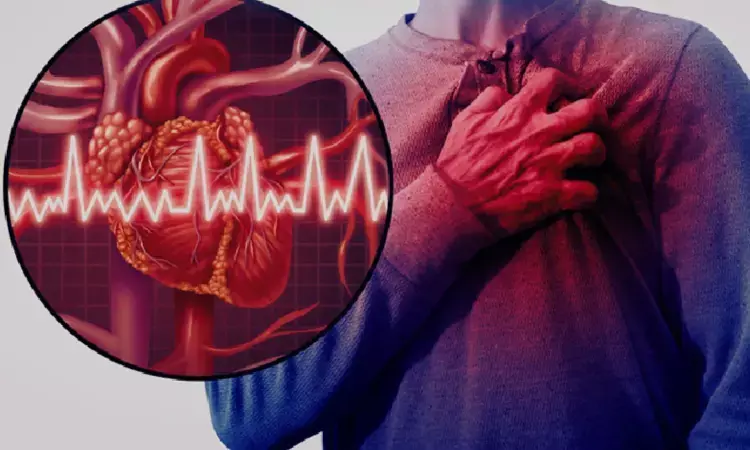- Home
- Medical news & Guidelines
- Anesthesiology
- Cardiology and CTVS
- Critical Care
- Dentistry
- Dermatology
- Diabetes and Endocrinology
- ENT
- Gastroenterology
- Medicine
- Nephrology
- Neurology
- Obstretics-Gynaecology
- Oncology
- Ophthalmology
- Orthopaedics
- Pediatrics-Neonatology
- Psychiatry
- Pulmonology
- Radiology
- Surgery
- Urology
- Laboratory Medicine
- Diet
- Nursing
- Paramedical
- Physiotherapy
- Health news
- Fact Check
- Bone Health Fact Check
- Brain Health Fact Check
- Cancer Related Fact Check
- Child Care Fact Check
- Dental and oral health fact check
- Diabetes and metabolic health fact check
- Diet and Nutrition Fact Check
- Eye and ENT Care Fact Check
- Fitness fact check
- Gut health fact check
- Heart health fact check
- Kidney health fact check
- Medical education fact check
- Men's health fact check
- Respiratory fact check
- Skin and hair care fact check
- Vaccine and Immunization fact check
- Women's health fact check
- AYUSH
- State News
- Andaman and Nicobar Islands
- Andhra Pradesh
- Arunachal Pradesh
- Assam
- Bihar
- Chandigarh
- Chattisgarh
- Dadra and Nagar Haveli
- Daman and Diu
- Delhi
- Goa
- Gujarat
- Haryana
- Himachal Pradesh
- Jammu & Kashmir
- Jharkhand
- Karnataka
- Kerala
- Ladakh
- Lakshadweep
- Madhya Pradesh
- Maharashtra
- Manipur
- Meghalaya
- Mizoram
- Nagaland
- Odisha
- Puducherry
- Punjab
- Rajasthan
- Sikkim
- Tamil Nadu
- Telangana
- Tripura
- Uttar Pradesh
- Uttrakhand
- West Bengal
- Medical Education
- Industry
Liraglutide does not impact heart rate or BP in diabetes patients during acute MI: Study

China: Liraglutide did not increase the heart rate of patients with diabetes during acute myocardial infarction (AMI) and did not lead to an increase in the dose of beta-blockers in the patients, a recent study published in the Journal of Diabetes has shown.
"It also did not impact blood pressure (BP) and showed better efficacy in lowering glucose levels without additional hypoglycemic events," the researchers wrote.
Cardiovascular disease, particularly acute myocardial infarction, is the leading cause of disease-related mortality in the world. Diabetic patients have a higher risk of AMI (2- to 4-fold increased) and cardiovascular mortality compared with nondiabetic patients.
Glucagon-like peptide 1 receptor agonists (GLP-1RAs) have been shown to lower all-cause and cardiovascular mortality in type 2 diabetes (T2D) patients. The probable rise in heart rate hinders its early use in AMI patients. Some experimental studies with AMI animal models and patients have indicated that liraglutide, a GLP-1RA, could ameliorate coronary no-reflow during percutaneous coronary intervention and improve left ventricular function.
Qianyi Li, Xinhua Hospital, School of Medicine, Shanghai Jiao Tong University, Shanghai, China, and colleagues aimed to determine whether liraglutide use in AMI patients as early as at the time of hospitalization would increase the heart rate in an observational retrospective study.
The study included 200 patients with acute myocardial infarction from 2020 to 2021. They were divided into three groups: T2DM + liraglutide group (n = 46), T2DM + non-liraglutide group (n = 42), and non-T2DM group (n = 112). The primary outcomes of the study were the differences in heart rate. Secondary outcomes were differences in systolic and diastolic BP.
Based on the study, the researchers reported the following:
- There were no significant differences in heart rate among the three groups at admission, the day before the first shot of liraglutide, and before discharge.
- There was also no significant difference in heart rate between diabetic patients with acute myocardial infarction and those on liraglutide during the hospital stay.
- There were no differences in beta-blocker dosages among the three groups.
- Liraglutide did not affect the blood pressure during acute myocardial infarction.
The findings revealed that liraglutide not only increased the HR in AMI patients but also did not affect BP. Liraglutide had a better efficiency on glucose lowering without additional hypoglycemic events.
"We found that liraglutide can be used safely in most diabetic patients during AMI, except in patients with low left ventricular ejection fraction (LVEF)," the researchers wrote. "GLP-1RA can reduce major adverse cardiovascular events in diabetic patients."
"Liraglutide use in AMI patients as early as at the time of hospitalization or before discharge might impart greater benefits to patients at very high risk of secondary arteriosclerotic cardiovascular disease. There is a need for more and further explorations," they concluded.
Reference:
Li, Q., Wu, C., Sun, S., Yang, L., Li, Y., Niu, Y., Zhang, L., Li, W., & Yu, Y. Liraglutide does not increase heart rate of diabetic patients during acute myocardial infarction. Journal of Diabetes. https://doi.org/10.1111/1753-0407.13517
Dr Kamal Kant Kohli-MBBS, DTCD- a chest specialist with more than 30 years of practice and a flair for writing clinical articles, Dr Kamal Kant Kohli joined Medical Dialogues as a Chief Editor of Medical News. Besides writing articles, as an editor, he proofreads and verifies all the medical content published on Medical Dialogues including those coming from journals, studies,medical conferences,guidelines etc. Email: drkohli@medicaldialogues.in. Contact no. 011-43720751


